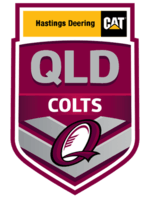Hastings Deering Colts
The Hastings Deering Colts is a junior rugby league competition based in Queensland, contested among teams made up of players aged 20 or under. The competition is administered by the Queensland Rugby League (QRL), and is contested by fourteen teams, thirteen of which are located in Queensland and one in northern New South Wales.
| Current season or competition: | |
 | |
| Sport | Rugby league |
|---|---|
| Instituted | 12 October 2017[1] |
| Inaugural season | 2018 |
| Chairman | Bruce Hatcher |
| Number of teams | 14 |
| Country | |
| Holders | |
| Most titles | |
| Website | qrl.com.au |
| Related competition | Jersey Flegg Cup Mal Meninga Cup |
History
Before the advent of the Hastings Deering Colts, there had been no statewide, full season under-20 competition in Queensland. The FOGS Colts Challenge, which ran from 1986 to 2017, only featured sides from south east Queensland. From 2008 to 2017, the National Rugby League (NRL) administered their own under-20 competition, the National Youth Competition, which featured the three Queensland-based NRL clubs, the Brisbane Broncos, Gold Coast Titans and North Queensland Cowboys, and a plethora of young players from the state. In 2016, the NRL announced that the National Youth Competition would be discontinued after the 2017 season, in favour of state-based under-20 competitions, administered by the Queensland Rugby League (QRL) and New South Wales Rugby League (NSWRL).[2]
In 2017, in preparation for the new competition, the QRL ran a shortened, statewide under-20 competition called the FOGS U20s Cup. The competition, which was won by the Redcliffe Dolphins, ran over nine-weeks, alongside the Mal Meninga Cup, and featured all 15 teams who would eventually participate in the Hastings Deering Colts.[3][4]
On 12 October 2017, the QRL announced the Hastings Deering Colts as the state's under-20 competition, running alongside the senior Queensland Cup competition, with 13 Queensland Cup sides fielding a team in the inaugural season.[1]
On 9 October 2018, the Victoria Thunderbolts left the competition after one season to return to the NSWRL setup, joining the Jersey Flegg Cup.[5]
Teams
The Hastings Deering Colts consists of 14 teams, thirteen based in Queensland and one in northern New South Wales. The league operates on a single group system, with no divisions or conferences and no relegation and promotion from other leagues. Much like the Queensland Cup, each club in the competition has an affiliation with a team in the NRL.
Season structure
Regular season
The Hastings Deering Colts follows the same regular season format as the Queensland Cup, with games usually played as curtain-raisers to the senior fixtures. Beginning in early March, a round of regular season games is then played almost every weekend for twenty-three weeks, ending in early September. Unlike the Queensland Cup, the Hastings Deering Colts features three full rounds where every team receives a bye and a split round in Round 19. These rounds are scheduled in to accommodate university exam periods.[6][7]
Teams receive two competition points for a win, and one point for a draw. The bye also receives two points; a loss, no points. Teams on the ladder are ranked by competition points, then match points differential (for and against) and points percentage are used to separate teams with equal competition points. At the end of the regular season, the club which is ranked highest on the ladder is declared minor premiers.
Finals series
After using a top six final series system in 2018, the competition followed the Queensland Cup in adopting a top eight final series for the 2019 season.[7][8] The eight finalists are split into two groups for the opening week of the finals series. The top four teams have the best chance of winning the premiership and play the two Qualifying Finals. The winners get a bye through to Week Three of the finals to play home Preliminary Finals, while the losers play home Semi-Finals in Week Two. The bottom four teams play the two Elimination Finals, where the winners advance to Week Two away games and the losers' seasons are over.
The winners of two Preliminary Finals then contest the Grand Final, which is played in late September at Suncorp Stadium, as a curtain-raiser to the Queensland Cup Grand Final.
Premiership Winners
| Year | Premiers |
|---|---|
| 2018 | |
| 2019 |
See also
References
- "New comp to strengthen pathways". 11 October 2017.
- "NRL replaces Holden Cup under 20s with new NSW, Qld competitions in 2018 - Fox Sports". www.foxsports.com.au.
- "QRL gets jump on new under-20s comp". 3 March 2017.
- "FOGS U20s Cup state final teams". QRL. 2 May 2017.
- "Victoria To Make Welcome Return To NSWRL". NSWRL. 9 October 2018.
- "Hastings Deering Colts draw". 25 January 2018.
- "Historic draw alignment to benefit fans". 13 December 2019.
- "High stakes and ladders: 2018 finals format". 31 July 2018.